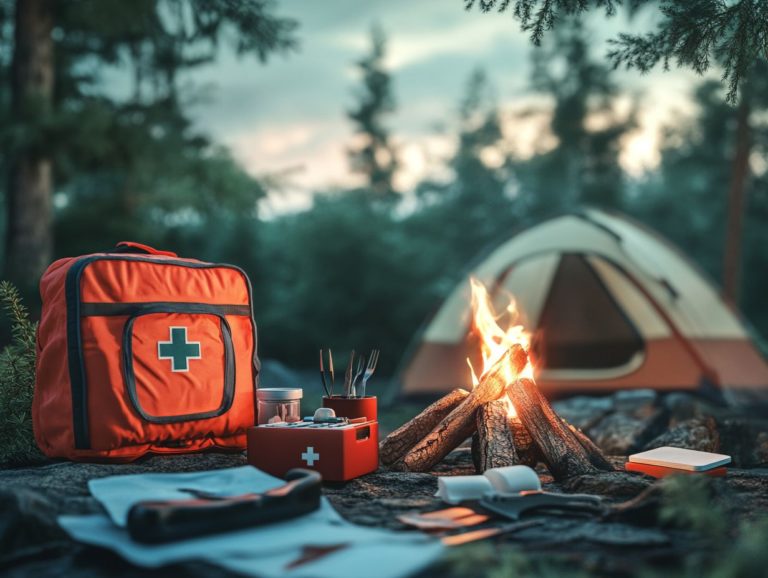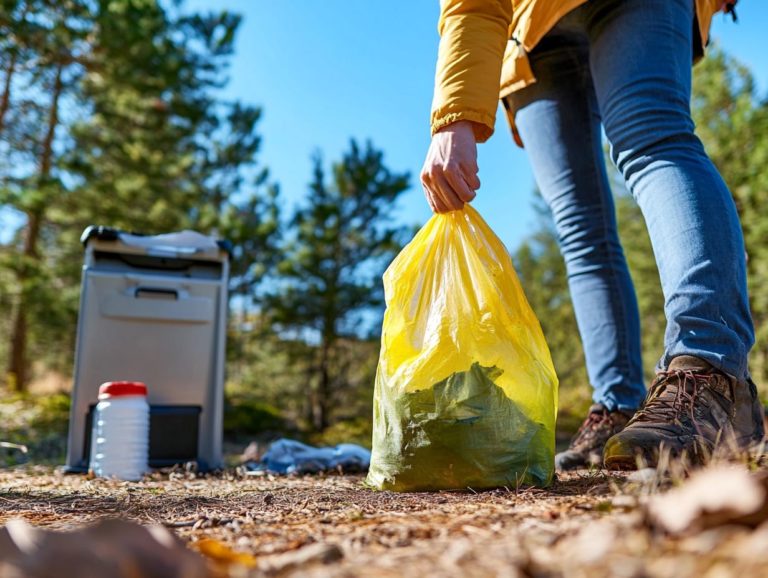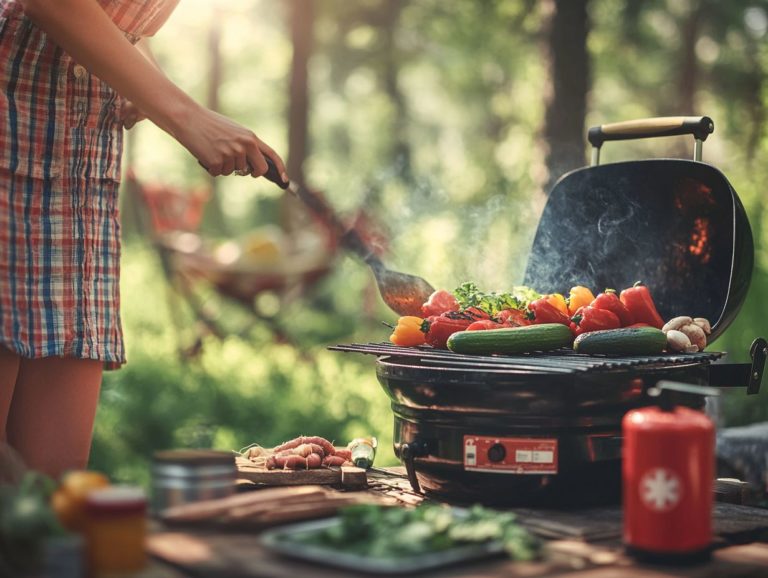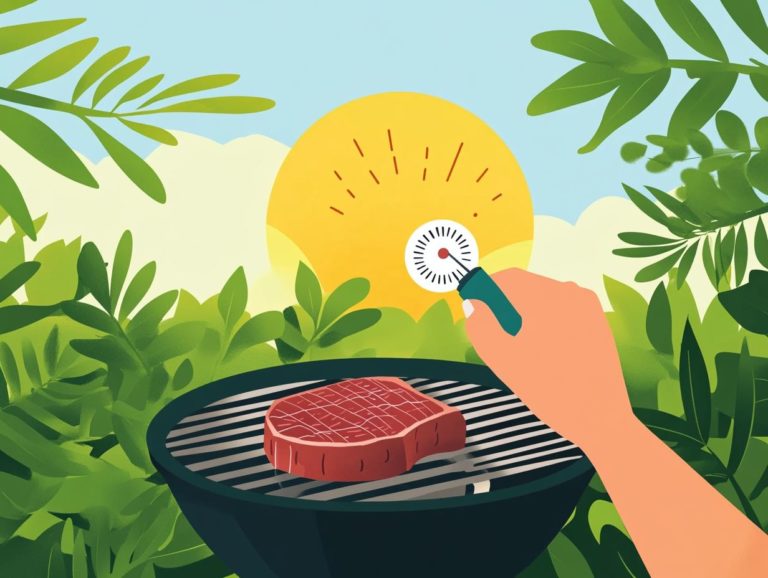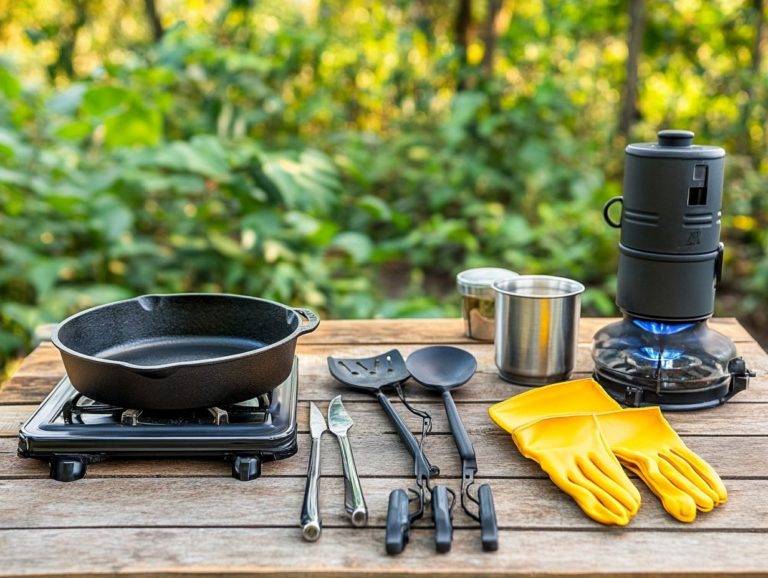5 Common Outdoor Cooking Hazards to Watch Out For
Outdoor cooking presents a wonderful opportunity to relish the beauty of nature, but it also comes with health risks you need to know about!
From fire hazards to the threat of food poisoning, being aware of these potential dangers is crucial for ensuring a safe and enjoyable experience. Let s explore five common outdoor cooking hazards you need to watch out for, paired with vital cooking guidelines to help you circumvent them.
Whether you’re grilling, barbecuing, or engaging in summer cookouts, grasping how to mitigate these risks will empower you to have a truly worry-free outdoor feast. Let s ensure your next outdoor cooking adventure is both delicious and safe!
Contents
- Key Takeaways:
- 1. Fire Hazards
- 2. Food Poisoning
- 3. Gas Leaks
- 4. Burns and Cuts
- 5. Insect Bites and Stings
- How to Prevent These Hazards?
- What Are the Essential Safety Measures for Outdoor Cooking?
- What Are the Proper Ways to Handle Gas and Charcoal Grills?
- What Are the Best Practices for Storing and Handling Food During Outdoor Cooking?
- How Can You Protect Yourself from Insects and Other Outdoor Pests?
- What Are the Emergency Steps to Take in Case of Accidents?
- Frequently Asked Questions
- What are the most common outdoor cooking hazards to watch out for?
- How can I prevent a fire while cooking outdoors?
- What should I do if I get burned while cooking outside?
- How Can I Avoid Food Poisoning When Cooking Outdoors?
- What Should I Do If I Am Bitten by Insects While Cooking Outside?
- How Can I Prevent Heat Exhaustion While Cooking Outdoors?
Key Takeaways:
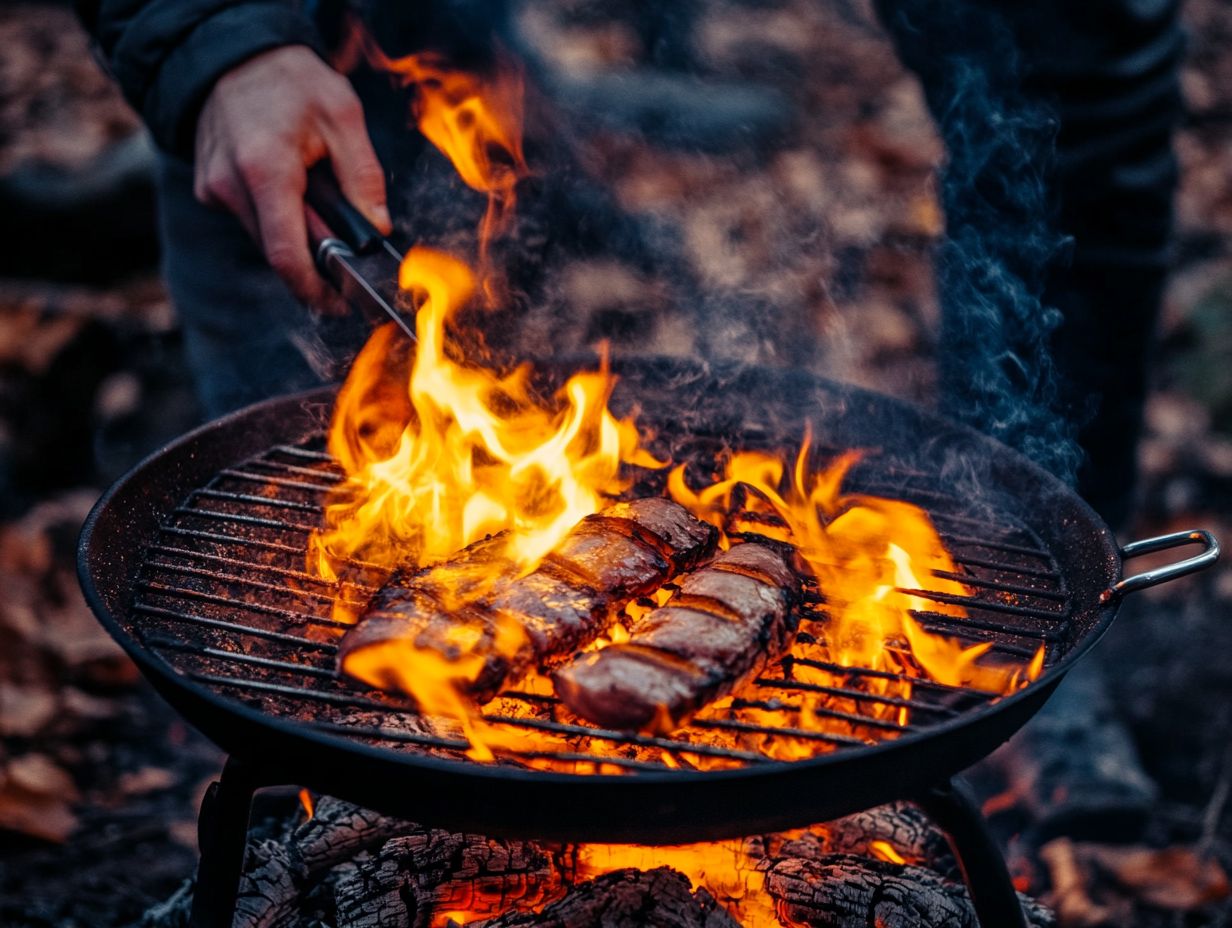
- Always be cautious of potential fire hazards, such as grease fires, when cooking outdoors, including open flames and dry vegetation.
- To prevent food poisoning and foodborne illnesses, properly store and handle food, and cook it to the correct temperature.
- Gas leaks can be dangerous, so regularly check for rust issues and maintain your grill. Have a fire extinguisher ready.
1. Fire Hazards
Fire hazards pose a significant concern during outdoor cooking, especially in the exhilarating context of summer grilling. In such situations, it’s important to be aware of fire pit cooking mistakes to avoid, as the thrill of barbecuing can sometimes overshadow safety precautions.
Whether you prefer propane gas or charcoal grills, grasping and addressing fire hazards is essential for a safe cooking experience. Proper grill maintenance and attentive supervision of children are crucial in preventing grease fires and cooking mishaps.
It’s vital to weave effective fire safety measures into your outdoor kitchen setup to protect your family and guests from potential barbecuing hazards. For instance, regularly inspecting your grill for wear and clogged vents can help prevent flare-ups, and following essential tips for outdoor cooking can enhance your safety practices.
Ensuring adequate ventilation allows smoke and heat to dissipate efficiently. As a parent, establishing a safety perimeter around the cooking area keeps children at a safe distance while you engage them in other safe activities.
Familiarize yourself and your family with the proper use of a fire extinguisher, ensuring everyone knows how to operate it effectively in case of an emergency. Keeping a close eye on cooking temperatures not only guarantees your food is delicious but also ensures it s cooked safely.
2. Food Poisoning
Food poisoning poses a serious risk when you’re indulging in outdoor cooking, especially during summer cookouts where perishable items often linger outside, setting the stage for foodborne illnesses that can ruin an entire gathering.
To prevent food poisoning, you must adhere to strict food safety practices, from handling meat properly to avoiding mixing raw and cooked foods (keeping them separate to prevent germs from spreading). Understanding cooking temperatures and employing effective food preparation methods are essential in safeguarding your health during grilling or barbecue events.
When you re preparing food outdoors, it s crucial to keep raw and cooked items separate to minimize the risk of bacteria spreading. Thoroughly washing your hands, utensils, and surfaces with soap especially after handling raw meat can significantly cut down the chances of contamination.
Marinating meat in the refrigerator instead of at room temperature is a smart way to maintain safety and prevent cross-contamination. When grilling, don t forget to use a food thermometer to ensure your meats reach safe internal temperatures 165 F for poultry and 145 F for various cuts of beef.
It’s often the little details in preparation and cooking that make a significant difference in keeping food safe.
3. Gas Leaks
Gas leaks pose a significant risk during outdoor cooking, especially with propane gas grills. These grills require careful handling and regular maintenance to avoid fire hazards and ensure your safety. Understanding how to detect gas leaks and knowing what to do in an emergency is crucial for anyone who enjoys summer grilling or barbecuing. Taking proactive safety measures dramatically reduces the chance of encountering dangerous situations stemming from gas leaks.
To identify a leak, stay alert for unusual smells reminiscent of rotten eggs, as propane is typically mixed with a distinctive odor for safety. Regularly inspect hoses and connections for any signs of wear or damage. Also, check your grill for rust or corrosion. If you suspect a leak, turn off the gas supply immediately, evacuate the area, and steer clear of anything that might create sparks or flames.
Routine maintenance helps prevent leaks. This includes cleaning burner holes and ensuring your grill is stored properly, creating a safer grilling environment.
4. Burns and Cuts
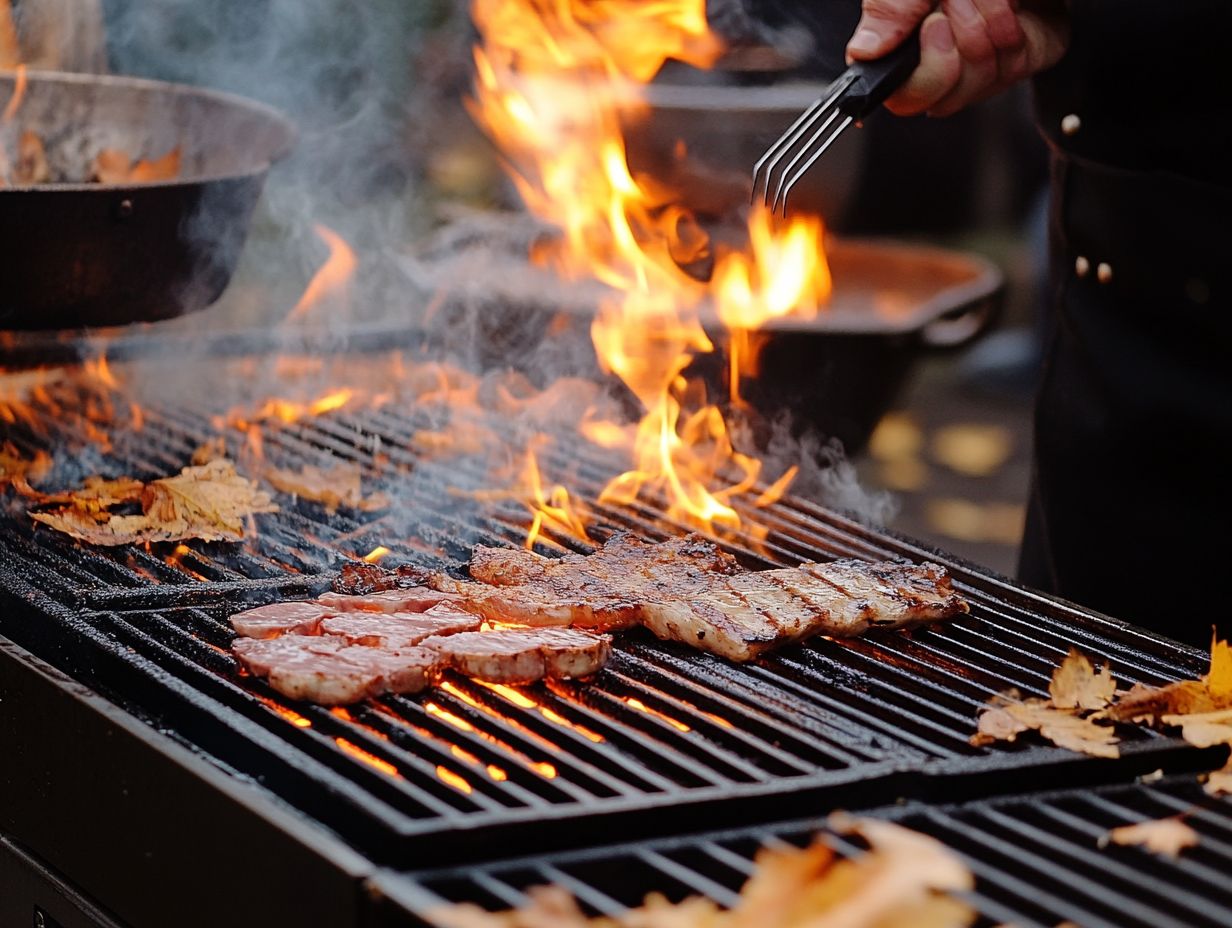
Burns and cuts are unfortunately common injuries during outdoor cooking, especially amidst the energetic atmosphere of summer grilling and barbecuing. The thrill of preparing meals on the grill can lead to accidents, highlighting the importance of kitchen safety and proper equipment handling. It’s crucial to learn first aid techniques for burns and cuts to ensure a safe cooking experience for everyone involved, especially children.
These injuries can range from minor burns caused by splattering grease to more serious cuts from mishandling sharp utensils. To minimize risks, equip yourself with appropriate grilling tools featuring long handles, and wear protective gloves and aprons. Keep a fire extinguisher nearby. Ensure your grilling area is free of flammable materials.
If you experience a burn, run cool water over the affected area for at least 10 minutes. For cuts, gently clean the wound with soap and water, and apply a sterile bandage afterward. Having a well-stocked first aid kit on hand greatly enhances safety during any outdoor cooking adventure.
5. Insect Bites and Stings
Insect bites and stings present a unique challenge during your outdoor cooking adventures, especially in summer when bees and other pests are buzzing around. This can create health risks for everyone, from adults to kids. While grilling or barbecuing, it’s essential to keep a close eye on the little ones and implement strategies to minimize encounters with insects, including bee stings. Knowing how to spot and respond to allergic reactions enhances your outdoor cooking experience, making it safer and more enjoyable.
To create a pleasant cooking environment, position your cooking stations away from flowering plants and stagnant water, as these attract various insects like mosquitoes and yellow jackets. Keep food covered when it’s not in use and address spills immediately to deter unwanted pests. Opt for natural repellents or wear suitable clothing to decrease the chances of bites.
Teaching your children to remain calm around insects is crucial, as sudden movements can provoke stings. By taking these precautions, you can truly savor your summer cookouts while minimizing the risks posed by common insects and potential barbecuing safety issues.
How to Prevent These Hazards?
Preventing hazards during outdoor cooking requires a comprehensive approach. Understanding the risks of barbecuing and following 5 essential checks before outdoor cooking promotes safety and health.
Focus on proper grill maintenance, adhere to food safety protocols, and ensure you reach the right cooking temperatures. These steps can significantly reduce accidents and health issues while savoring the summer grilling season.
Be prepared for emergencies by knowing how to use a fire extinguisher. This offers an added layer of security for you and your guests.
Regularly inspect and clean your grill to avoid grease buildup, which can lead to dangerous flare-ups. Store food at the correct temperatures before and after cooking to keep harmful bacteria at bay.
Use a meat thermometer to confirm that your proteins reach safe internal temperatures. This ensures a worry-free dining experience.
Keep a first aid kit close at hand and familiarize yourself with basic first aid for burns or cuts. This is especially important for children involved in the cooking process.
Maintain a clear distance between the cooking area and flammable materials. This ensures that your fun barbecue remains safe and enjoyable for everyone involved.
What Are the Essential Safety Measures for Outdoor Cooking?
Essential safety measures for outdoor cooking are critical for minimizing health risks and ensuring an enjoyable experience during summer grilling activities. To ensure safety, it’s important to learn how to recognize unsafe cooking conditions outdoors.
Always keep raw meats separate from other ingredients to protect your loved ones from foodborne illnesses! Using distinct cutting boards and utensils for different food types helps maintain hygiene and adhere to food safety practices.
Regarding grill safety, clear the cooking area of any flammable materials. Routinely check your propane tanks or charcoal supplies for potential leaks or hazards.
Always have a water source or fire extinguisher nearby for emergencies. Supervise children to prevent accidents, encouraging them to maintain a safe distance from the grill while engaging in age-appropriate tasks.
What Are the Proper Ways to Handle Gas and Charcoal Grills?
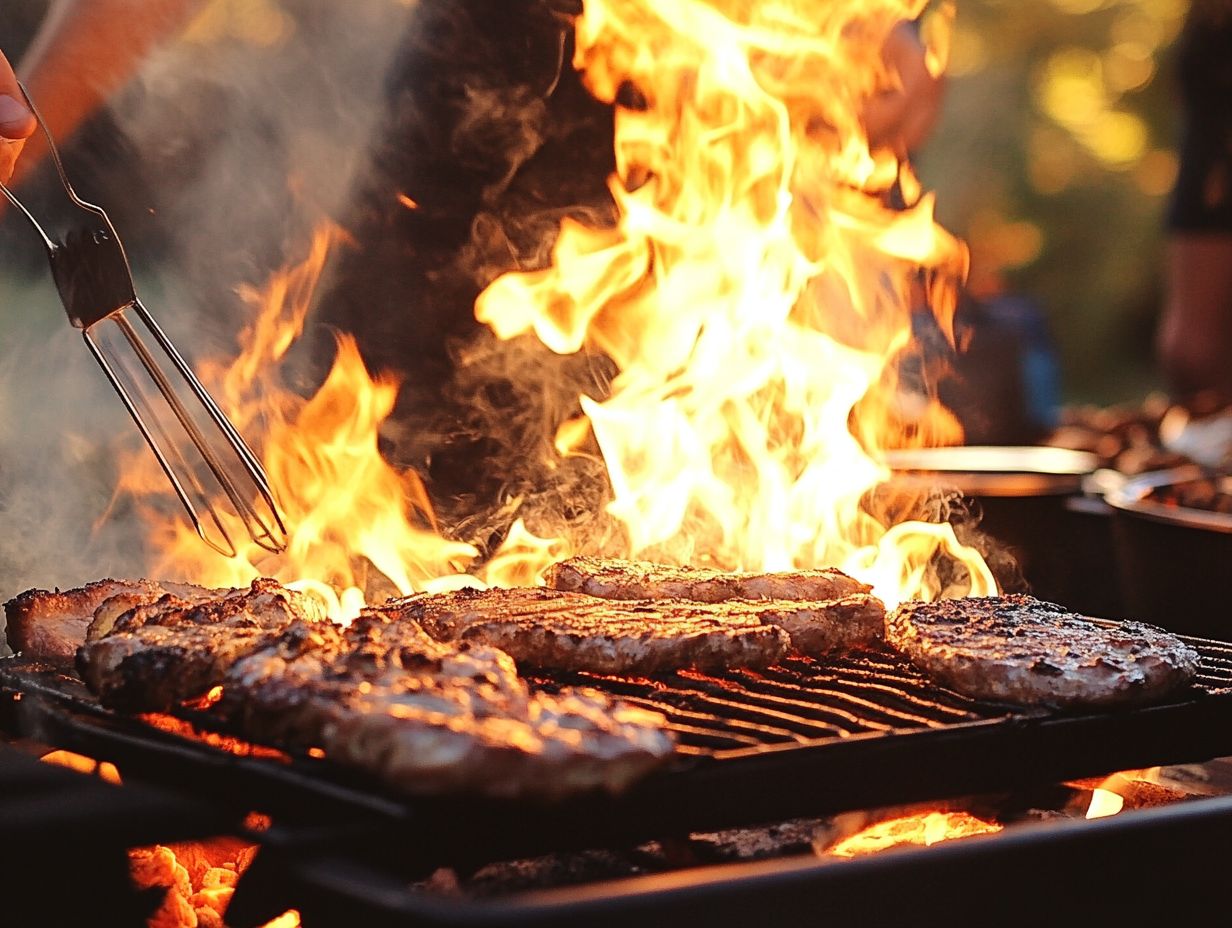
Properly handling gas and charcoal grills is essential for safe outdoor cooking. To avoid mishandling, it’s important to follow guidelines like those found in 5 ways to ensure safe cleanup after outdoor cooking, as mishandling can lead to serious fire hazards, injuries, and discomfort during delightful summer cookouts.
Understand the nuances between gas and charcoal grills, including their fuel sources, maintenance requirements, and safety protocols. This knowledge enhances your grilling experience while minimizing risks.
For gas grills, secure the propane tank connections, and check for leaks with soapy water before each use. Clean the burner tubes to maintain efficient heating.
Regular maintenance, such as cleaning grease traps and inspecting hoses, is crucial in preventing flare-ups and prolonging the life of your grill.
Charcoal grills require you to manage ash buildup and ensure that coals are completely extinguished before storage. Each type comes with its unique risks: gas grills can pose dangers related to gas leaks, while charcoal grills may lead to ash and ember hazards.
Familiarity with these distinctions not only enhances safety but also contributes to more flavorful and well-prepared meals.
What Are the Best Practices for Storing and Handling Food During Outdoor Cooking?
Best practices for storing and handling food during outdoor cooking are essential to prevent foodborne illnesses and ensure the health safety of everyone involved, especially during those summer grilling sessions where perishable items are particularly vulnerable.
By understanding food safety protocols especially regarding mixing raw and cooked foods and proper storage techniques you can protect your family and guests while enjoying a delightful barbecue. Implementing these practices will create a safe and enjoyable cooking environment!
Keep raw meats separate from ready-to-eat foods throughout the cooking process for a safer cooking experience! Use distinct cutting boards and utensils to reduce the chances of mixing raw and cooked foods.
Store perishable items in a cooler with ice packs, regularly checking the temperature to ensure it remains below 40 degrees Fahrenheit. Promptly refrigerate any leftovers within two hours to prevent bacterial growth.
Following these guidelines not only promotes food safety but also enhances your overall outdoor cooking experience. To ensure a successful outing, check out the top 10 outdoor cooking mistakes to avoid and enjoy your outdoor cooking without worry!
How Can You Protect Yourself from Insects and Other Outdoor Pests?
Protecting yourself from insects and other outdoor pests is crucial during your summer cooking adventures! Those bites and stings can introduce health risks that might put a damper on your barbecue fun. Understanding the various outdoor pests you might encounter and implementing preventative measures will help you maintain a pleasant cooking environment.
To elevate your comfort while grilling or hosting a picnic, consider setting up barriers like nets or screens around your cooking area. Incorporating citronella candles or essential oils such as lavender and eucalyptus can naturally keep those unwanted guests at bay. Also, steer clear of heavily scented perfumes or colognes, as they can attract insects.
Keep food covered and promptly clean up any spills to significantly reduce the likelihood of inviting pests. Preparing in advance by checking local pest trends will also arm you with tailored strategies for your specific environment!
What Are the Emergency Steps to Take in Case of Accidents?
In the unfortunate event of a cooking mishap while you’re outdoors, knowing the essential emergency steps can make all the difference in minimizing harm and ensuring a swift response, especially when dealing with fire hazards or injuries. Having a comprehensive emergency response plan, along with basic first aid knowledge, is invaluable when you’re grilling or barbecuing!
Understanding how to treat burns is a vital first step, as these can arise from hot grills or splattering grease. Promptly cool the affected area with cool, running water to ease the pain and prevent further skin damage.
If a fire breaks out, quickly extinguish it with the right fire extinguisher or a bucket of sand to stop the flames from spreading!
It s also essential to keep a well-stocked first aid kit nearby, complete with supplies for treating minor injuries and a clear, accessible guide for emergencies. Regularly checking this kit ensures that all items are current and effective, further enhancing safety during your culinary adventures.
Frequently Asked Questions
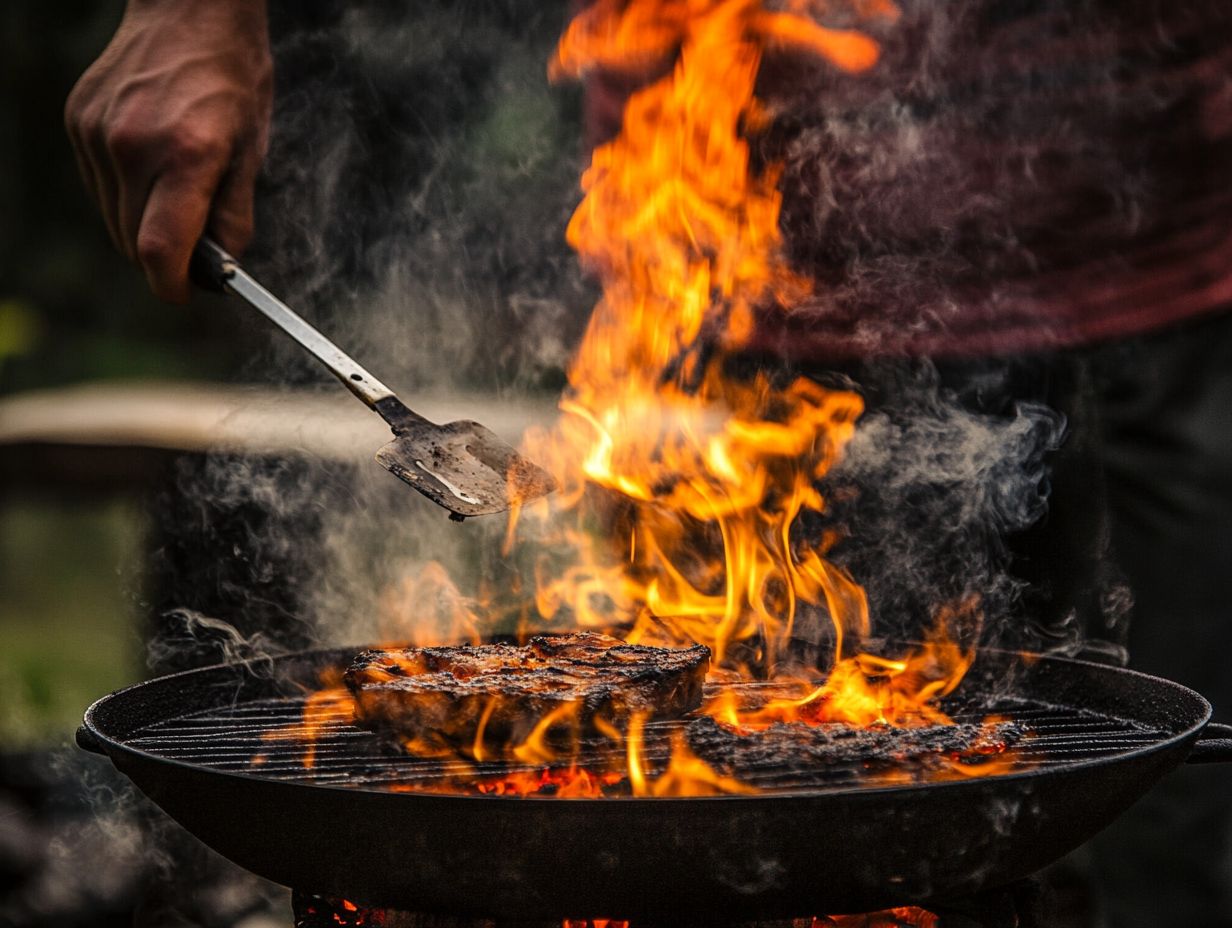
What are the most common outdoor cooking hazards to watch out for?
The five most common outdoor cooking hazards to be aware of are fire, burns, food poisoning, insect bites, and heat exhaustion. To learn more about these dangers and how to stay safe, check out the top risks of outdoor cooking and how to avoid them.
How can I prevent a fire while cooking outdoors?
To prevent a fire while cooking outdoors, always keep a fire extinguisher nearby, never leave a fire unattended, and avoid cooking near flammable materials!
What should I do if I get burned while cooking outside?
If you get burned while cooking outside, immediately run the affected area under cool water for 10-15 minutes and cover it with a clean bandage. Seek medical attention if the burn is severe!
How Can I Avoid Food Poisoning When Cooking Outdoors?
To prevent food poisoning, always wash your hands before handling food.
Use separate cutting boards for raw and cooked foods.
Cook meats to the right internal temperature (this means ensuring they reach a safe heat level) to kill harmful bacteria.
What Should I Do If I Am Bitten by Insects While Cooking Outside?
If you get bitten by insects, move away from the area right away.
Apply a cold compress to help reduce swelling.
If you experience a severe allergic reaction, seek medical help immediately!
How Can I Prevent Heat Exhaustion While Cooking Outdoors?
Stay hydrated and take breaks in the shade to cool down.
Avoid cooking during the hottest times of the day.
Wear light, loose clothing and consider using a fan or mister to stay cool.

